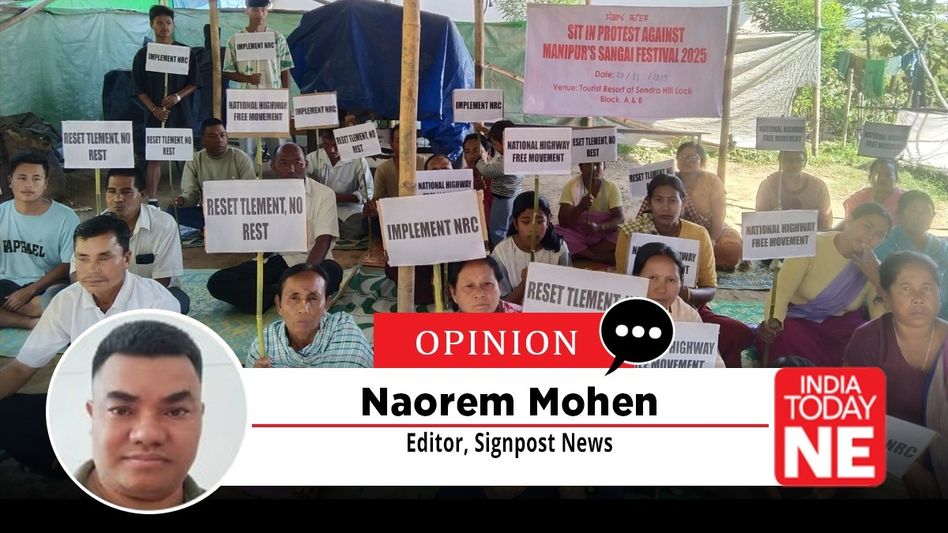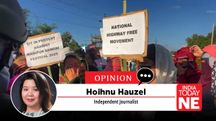When the Constitution Itself Is Kept in Relief Camp, How Can We Celebrate the Constitution Day
In Manipur, the Constitution has itself become an internally displaced document—exiled from the land it governs, stripped of all force, and reduced to sheltering in the same relief camps as the citizens it once promised to safeguard.

In Manipur, the Constitution has itself become an internally displaced document—exiled from the land it governs, stripped of all force, and reduced to sheltering in the same relief camps as the citizens it once promised to safeguard.
The Preamble’s solemn assurance of justice, liberty, equality, and fraternity has been driven out of the lives of over 70,000 people who are barred from their villages, choked on their own highways, forbidden from worshipping at their ancestral hills, and denied the government they elected. The founding charter of the Republic now survives only on paper, homeless in the very state it was sworn to protect.
Today, on 26 November 2025, while the rest of India celebrates the Constitution as a living, breathing guarantee of justice, liberty, equality and fraternity, in Manipur the very document is itself an internally displaced person—homeless, powerless, and waiting in a relief camp of broken promises.
What is painfully missing here is government of the people, by the people, and for the people. Political justice has been suspended for over nine months under President’s Rule. Economic justice is reduced to Rs 84 a day that is a tight slap to the dignities of the displaced. Liberty of movement exists for all community on the national highways except Meitei.
Thus, Equality before the law is a myth. Even the freedom to worship at ancient sacred sites has become a privilege granted or denied on the basis of ethnicity.
Fundamental rights—Article 14, 19, 21, 25—remain on paper while over 70,000 citizens continue to live as Internally Displaced People in relief camps or as migrants in other cities for two-and-a-half years. This is not the failure of one community against another; it is the collective failure of the Republic to live up to its own founding document for every citizen of Manipur, whether Meitei, Kuki, Naga or anyone else.
The most glaring assault on the Preamble is the continuing suspension of political justice. Manipur has a 60-member Legislative Assembly elected in March 2022 with a clear majority: the NDA led by BJP won 37 seats (32 BJP + allies). The term of this House runs until March 2027. By any democratic norm, a state with an elected House that still commands the “magic number” should have a popular government.
Yet since 13 February 2025, when Chief Minister N. Biren Singh resigned amid mass protests, Manipur has been under President’s Rule—the latest extension taking it to February 2026. The constitutional ground cited is “failure of constitutional machinery”. In reality, the machinery that has failed is the political will in New Delhi to allow the elected representatives to function.
On May 28, 2025, ten BJP MLAs, led by Thokchom Radheshyam, called on Governor Ajay Kumar Bhalla and submitted a letter stating that 44 legislators had agreed to form a government in line with the people’s mandate and were awaiting the final nod from the party’s central leadership. The plea was disregarded. Months later, in October 2025, nearly 29 BJP MLAs camped in Delhi for days seeking an audience with the party’s top brass, only to return empty-handed without meeting any key central leaders.
What Manipur is witnessing is political injustice on a staggering scale. Fifty-nine duly elected representatives have been rendered powerless, stripped of their constitutional roles under Articles 168 and 170: they can neither debate, legislate, nor hold the executive to account. The people of Manipur have effectively been denied the government they voted for. Instead, under an indefinite spell of President’s Rule—originally intended as a rare emergency measure under Article 356—the Governor, guided by faceless bureaucrats in New Delhi, signs every file, disburses every rupee, and dictates every policy without a moment of legislative oversight or democratic accountability. Emergency rule has quietly become permanent remote-control governance.
More than 70,000 displaced citizens have languished in over 300 relief camps for more than two and a half years, with many others forced to flee the state as migrants. Central government norms for disaster relief clearly mandate ₹150–200 per person per day in the wake of a calamity, yet in Manipur the assistance has been slashed to a derisory ₹84. Until November 2025, camps at least received dry rations alongside this paltry cash amount.
Now, under a much-publicised switch to Direct Benefit Transfer, the administration has axed in-kind aid entirely and trumpets ₹84 per day (₹2,520 monthly for a family head) as sufficient. In 2025 prices, this sum cannot even secure three basic meals, even at subsidised PDS rates. The move to DBT has silently ended all non-cash support: blankets, mosquito nets, sanitary kits, and cooking utensils once supplied by NGOs and district authorities have virtually vanished under the pretext that “cash is being given,” leaving thousands of internally displaced families colder, hungrier, and more vulnerable than ever.
The fundamental right to education under Article 21A lies in ruins for tens of thousands of displaced children in Manipur. Over 25,000 are school-age children, most of whom have not seen the inside of a proper classroom since violence erupted in May 2023. Children who dream of studying in decent private schools discover that school vans, uniforms, and textbooks come at a cost no displaced family can bear; private institutions, already stretched, cannot offer free seats on charity. Forced back to overcrowded government schools in the camps or nearby areas, they face chronic teacher absences and the complete loss of facilities they once took for granted. An entire generation is growing up illiterate under the shadow of rifles, their constitutional right to free and compulsory education reduced to ink on paper that never reaches them, while their future itself remains internally displaced.
National Highways remain state's sole lifelines to the rest of India, yet for the Meitei community they have become corridors of selective strangulation. In March 2025, the Union Home Ministry solemnly assured Parliament that free and non-discriminatory movement would be restored on both highways. Nine months on, that promise is in shreds.
What was pledged as equal access for all citizens has quietly hardened into a discriminatory chokehold targeting one community alone. Article 19(1)(d) and (e)—the right to move freely and reside anywhere in India—stands brutally partitioned.When displaced families try to return home, the state that is duty-bound to protect them often becomes the aggressor. Meitei IDPs marching towards Churachandpur and Dolaithabi have been tear-gassed, lathi-charged, and injured by security forces. The right to return to one’s own home has become an act of rebellion punishable by state violence.
Two of Manipur’s most revered Meitei sacred sites now stand as stark emblems of state collapse. Mount Koubru, the mythic abode of the guardian deity Ibudhou Koubru, has fallen under the effective control of armed Kuki militants. Likewise, the Thangjing Hill range—a protected heritage site under the Manipur Ancient Monuments and Archaeological Sites Act, 1976—has seen large Christian crosses planted along its sacred ridge.
What should be inviolable religious and cultural heritage has been transformed into contested ground, with the state either unwilling or unable to protect the faith and traditions of one of its foundational communities.
The Constitution is not being interpreted, enforced, or even defended; it is being mocked—openly, daily, and without consequence. Until that mockery ends, Constitution Day here will remain what it has become: a day of mourning for a promise that was made to every Indian, but is being deliberately withheld from the people of this state.
How, then, can the nation celebrate today with any sincerity when, in Manipur, the Constitution itself has been reduced to a refugee—displaced, powerless, and taking shelter in the very relief camps meant for the citizens it was framed to protect?
Copyright©2025 Living Media India Limited. For reprint rights: Syndications Today









